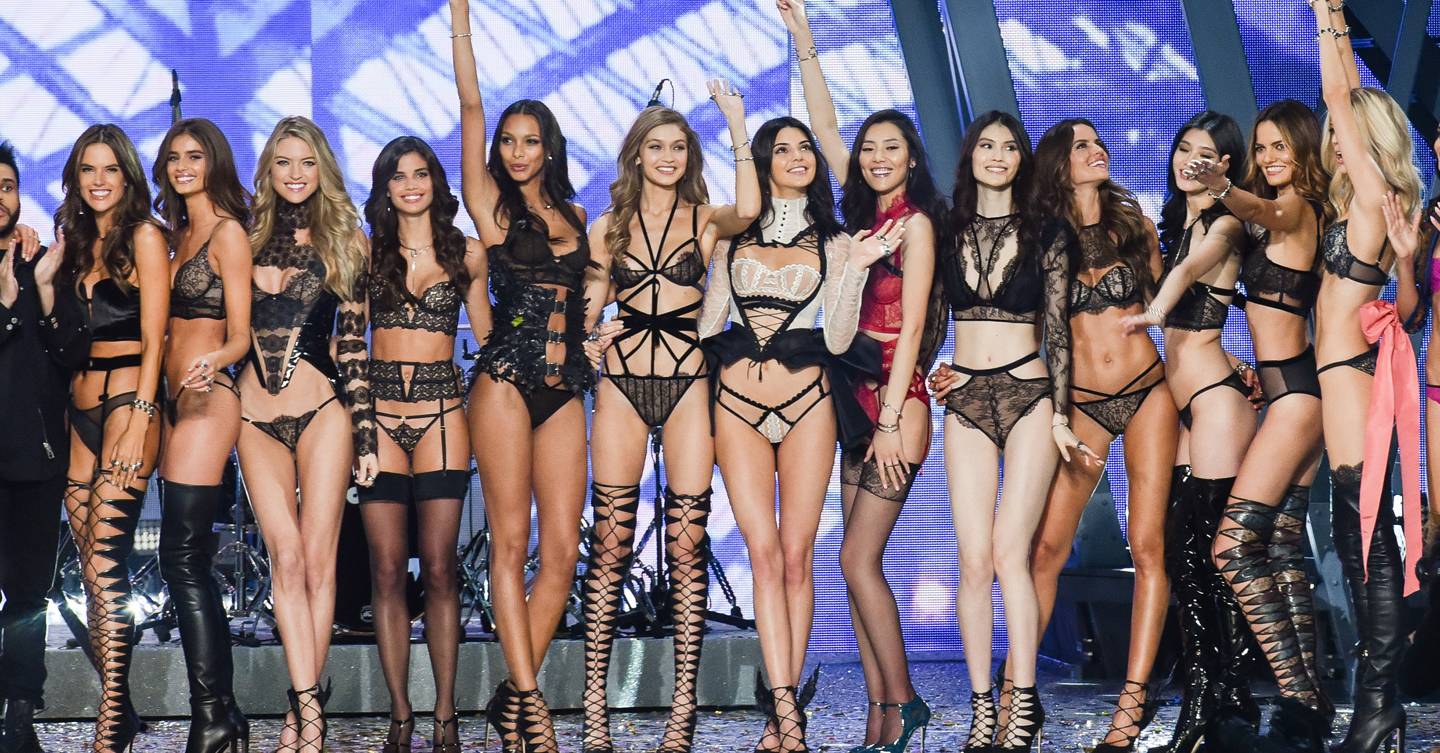The Victoria’s Secret Show has the potential to be a site of female positivity, confidence and girl-power. Unfortunately, year-on-year it undermines this, conveying elitism and representing warped ideas about body-image, self-worth and social standards.
I wanted to write this reflection with more positivity. I started by writing a list of everything I love about the show; why I eagerly anticipate it every year, why it’s entertaining to watch, a source of inspiration, girly, fun. I came up with three reasons:
- The show demonstrates friendship and girl-on-girl support. The models cheer each other on, hug each other, and when Ming Xi took a fall last year, the angels comforted her backstage. In a world where media represents females as spiteful, the sisterhood we see on screen challenges the stereotype that women (particularly in fashion) have to be malicious to be successful.
- The creative fusion of fashion, music and lighting is truly entertaining. The extravagant designs demonstrate creative uniqueness, and the variety of random themes taking a refreshing and playful break from designer trends. This is sure to inspire young creatives to think outside of the box.
- Seeing women strut confidently about in underwear in-front of a live audience/numerous cameras does seem empowering…
https://www.youtube.com/watch?v=qTUtrbtGBP8
My article didn’t work, and I couldn’t ignore the great big size 0 elephant in the rooms about the show’s darker side. I found myself trying to make excuses for the show, putting the blame on viewers for feelings of insecurity. In fact, through considering the positive effects of the VS fashion show, I had unwittingly written a list of the negatives. Given the brand’s continued failure to diversify its models and reflect the variety of the female population, everything that could be good about it takes a complete 360 and becomes its biggest failure. Compiled with most optimism, my little list of pros became futile. So, I wrote a new list…
- The models’ teamwork and sisterhood represents exclusion. The diamante-encrusted hugs become reminiscent of high-school cliqueism- if you’re not like us you can’t sit with us. If you don’t look (or train to look) like an angel, you won’t be as liked, and you’ll have no one to sit with. The models have left classroom behaviours behind, but for young impressionable viewers, the shows subliminal messages are likely to be influential.
- Confidence is conditional. The girl’s apparent self-love and confidence is admirable, but this is apparently ‘earned’ not internal. The models all fit a uniform physical template, ‘achieved’ through Spartan training and specific genetic coding. Can/should I feel confident in myself if I don’t match this?
- Even the designs themselves can be offensive. Like any good fashion show, VS use global influences to inspire their collections. Though the lack the racial representation alongside some dodgy and insensitive choices always creates a perfect recipe for embarrassing cultural appropriation.
The show’s take-home message is: with the mindset of an Olympian, push yourself to physical extremes and the world will applaud and revere your body. The models make tons of “sacrifices” to be in the show, always working harder than the next, and being eternally “grateful” for being chosen. This suggests female appreciation is in limited supply; only handed to the few who graft for it/are born like it. To make something as fundamental as self-worth into a competition is disturbing, although this is an ingrained social problem extending far beyond the realm of Victoria’s Secret.
remarkable that in 2018 some of us are just learning that victoria’s secret is not a bastion of body positivity
— phenomenological woman (@ruchuleh) December 7, 2018
Although perhaps it’s the barrage of ‘tips’ and ‘how-to’ press accompanying the show that are most worrying. The ‘Train like an Angel’ routines, diet reveals, make-up routines…they all bridge the fantasy of VS with the reality of audience’s everyday lives. If viewers’ after-show behaviours started and stopped at buying overpriced sparkly lingerie, all that’s damaged is our pockets. But when it comes to adopting the onslaught of tips and regimes, our investment in the show deepens. This is something relatively new, as while the show has been broadcast since 1995, the recent explosion of the internet/social media means this information is available quite literally at follower’s fingertips. Liquid-only diets, fasting, excessive exercise – these are some of the more extreme methods used by models to prepare for the show. They aren’t maintainable, and they’re used short-term before the show. Though without having the fashion show as a target/reward, impressionable viewers have no-where to draw the line. Perhaps Victoria’s ‘secrets’, were better left unshared.
 In a dynamic world trying hard to embrace and celebrate women’s bodies, VS’s failure to diversify their line-up is an annual reminder of the industry’s audacity to capitalise on insecurity. The show’s youthful following, along with the host of press and advice that accompanies it demonstrates the uncomfortable and invasive influence brands continue to hold over consumers. With some simple adaptations, the show could enter the 21st century and be something of greatness. Though for now, it will continue to be a long, lean step back in the wrong direction.
In a dynamic world trying hard to embrace and celebrate women’s bodies, VS’s failure to diversify their line-up is an annual reminder of the industry’s audacity to capitalise on insecurity. The show’s youthful following, along with the host of press and advice that accompanies it demonstrates the uncomfortable and invasive influence brands continue to hold over consumers. With some simple adaptations, the show could enter the 21st century and be something of greatness. Though for now, it will continue to be a long, lean step back in the wrong direction.
Confused how like it’s 2018 and so many campaigns have body diversity but the Victoria’s Secret fashion show is really still out here only casting size 0?
— alex (@almos22) November 9, 2018
Anonymous
Images: Glamour UK, Independent.ie


